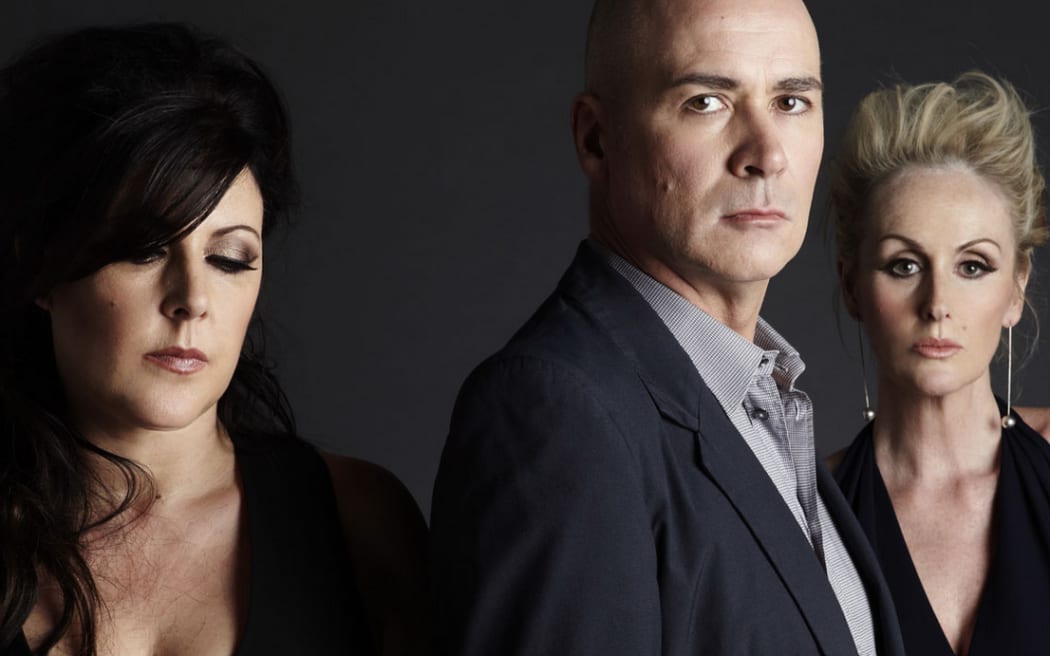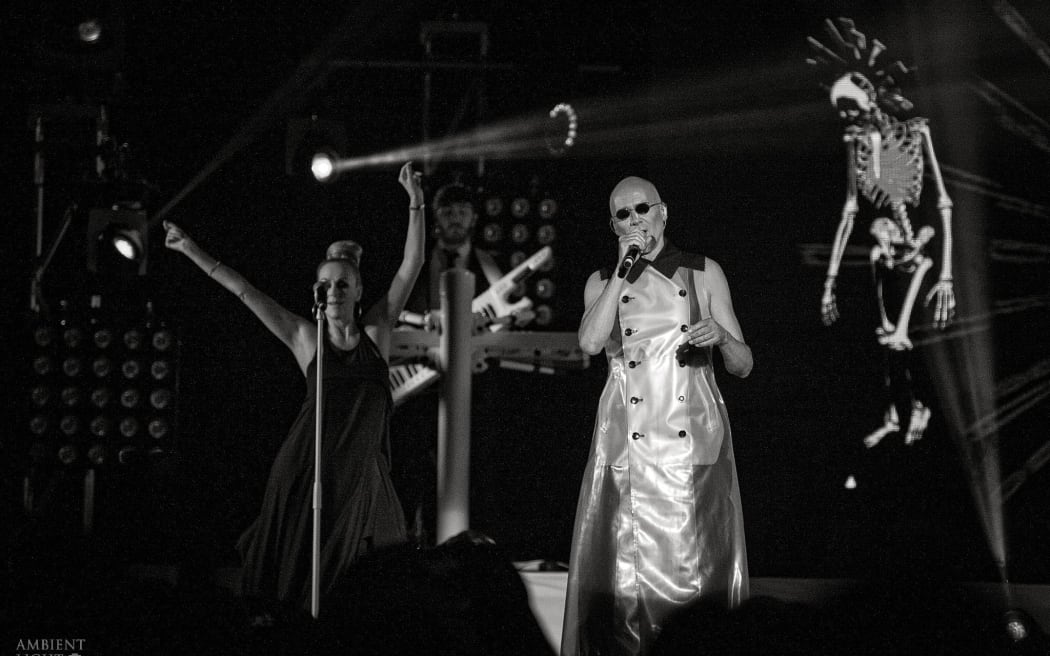Drifting from one casual job to another, Phil Oakey had zero ambition to be in a pop group. His one instrument, a saxophone, lay abandoned on the floor.
But in 1977, everything changed with a single note on his front door inviting him to join what later became The Human League - a band at the forefront of 80s synth-pop.
They had huge hits with ‘Don’t You Want Me’, ‘Love Action’ and ‘The Sound Of the Crowd’, Oakey also had a world-wide solo hit with Giorgio Moroder in ‘Together In Electric Dreams.’
Oakey, the lead singer, was catapulted onto the world stage, and became famous for not only his poignant lyrics but his adventurous and gender-bending style - once sporting a household power lead complete with plug as a necklace.
After 40 years of ups and downs, The Human League is still touring, and will be landing on our shores alongside other 80s hitmakers in Aotearoa's largest ever Sound Series.

The Human League Photo: Screenshot
Oakey is “Completely amazed” to still be making his living as a musician, he tells Susana Lei'ataua.
“I don't know why we deserve to have the luck that we have had, seeing as we're not especially talented or wonderful or anything. But somehow, I think we just got in the right teams at the right time and managed to keep it going.
“I think that if there is one thing that we have done, it's we've been persistent. Times when a lot of people might have given up, we didn't give up. And we stuck it out and when any one of us was finding it a bit hard, the other two kept it going, and that's why we're still here I think.”
The band still maintain a studio and rehearsal space in their hometown of Sheffield.
“We've had a studio in the middle of Sheffield now since 1986. And we gather there, and we go through the songs and try and make them better.”
He has lived in the same Sheffield house for 40 years, he says.
“The house is full of loads of old rubbish that I've accumulated. Do you know, the TV show Steptoe and Son? Well, my house is like Steptoe’s yard, there's just loads of old rubbish and synthesizers and books and things. It's almost impossible to deal with. I don't know how I would sell it. And we've done that at the studio as well. We got the studio in 1986. And it's just slowly filled up with gear.”
The secret to their longevity is staying out of each other’s way, Oakey says.
“I think we all do slightly different things. I tend to be the musical director, Susan’s [Ann Sulley] very good at promotion and publicity, Joanne [Catherall] sort of administers and watches everything that's going on and organises everything. We, also I think over the years, we've learned how to get out of each other's way as well. We tend to tour in a bus when we're in Europe or America. And so, if you know that you're annoying someone, you go to the other end of the bus and try not annoy them for a couple of days.”
Oakey joined the band with Catherall and Ann Sulley in 1977 and they were soon at the forefront of electronic music that was emerging in the post-punk era.
“I never worked out whether we were fashionable, or whether we just liked synthesizers, we made our records with synthesizers, because we didn't know how to play guitars at the time.
“And you could program them and you didn't actually have to play in real time. I'm not a very good keyboard player. So, we could make the machines do that over time. And we just happen to be lucky that synthesizers had come along. Otherwise, I'd probably be working in a bookshop, I think by now, or would have been working in a bookshop for 30 years.”
Now 67 Oakey still enjoys the touring life.
“I'm 67 so I can't be young anymore but I still seem to be getting away with doing a lot of daft things, but maybe people are looking at me now and thinking, why is he doing that? He's too old.”
Oakey is still interested in fashion, he says.
"I'm always looking for a bit of a new shape and to walk into a room and people maybe would look at look at you and go, he shouldn't really be wearing those trousers. And I like that.
"I'm championing flares again at the moment, a lot of flared trousers.”
His look remains an important part of Human League’s appeal.
“I know that as a pop person, I'm a bit of a cartoon, It's not a very subtle look, you're trying to look quite big and different.
“Anything a bit weird. There are a few good designers about at the moment. There's Rick Owens in America and Yamamoto in Japan, there's a guy called Walter Van Beirendonck who comes from Antwerp. These are all quite famous people who just do slightly different things.
“I never grew out of glam underneath it all I will always be a glam rocker. So, I'm back wearing platforms and high heels.”
He still wears the make-up but dialled down a little from his early 80s look, he says.
“I've lost all my hair so it can look a bit weird if you wear too much makeup with no hair, you end up looking like Yul Brynner playing a genie in Arabian Nights from 1950 or something and also your skin goes a little bit wrinklier.
“I used to be able to draw a really nice line around my eyes very easy. I get an eyeliner, I just do a straight line. And now when I do that, it's all wobbly. I look like Alice Cooper. So unfortunately, I have to be a lot more subtle.”
The glam bands of the early 1970s, particularly Roxy Music, were the catalyst for the bands formation, he says.
“We loved Roxy Music and we loved David Bowie, we loved the Sweet, we loved Marc Bolan. They were the inspirations to us ...I saw Roxy Music one night, It must have been about 1972, It completely changed my life.”
The business has turned upside down since The Human league were a chart-topping act in the 1980s, he says.
“Everyone's indie now. The thing is there aren't really any record labels anymore. It's just that the whole industry that we were in has turned upside down. We were in an industry where you went and begged Richard Branson to give you some money, and then sold records through his record label and didn't get paid much money for doing shows. And now we go out and get paid for doing shows and don't get any money for doing recordings.”
The Human League are performing in Auckland, Wellington and Christchurch in February.

The Human League Photo: Doug Peters/Ambient Light

